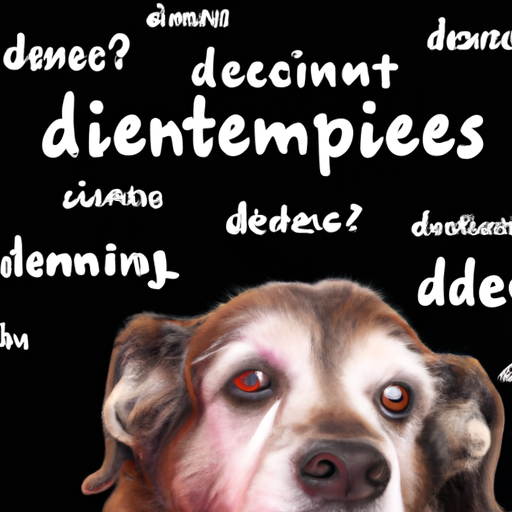As a caregiver, you are the frontline in your pet’s health. You are the first to notice the subtle changes in your dog’s behavior, which may hint at a more significant underlying issue. One condition that is often overlooked in dogs is dementia, also known as Canine Cognitive Dysfunction (CCD). Understanding the signs of dementia in dogs can help you provide the best care for your pet during their golden years.
1. Change in Sleep Patterns
A dog suffering from dementia may experience significant changes in their sleep patterns.
- They may sleep more during the day and be restless or awake at night.
- You might notice that your pet has trouble settling down for sleep or wakes up in the middle of the night.
This change in sleep patterns may be subtle at first, but as the disease progresses, the disturbances may become more noticeable.
2. Disorientation
Disorientation is one of the most common signs of dementia in dogs.
- Your dog may seem confused or lost in familiar surroundings.
- They may have trouble navigating around furniture or get stuck in corners.
This disorientation can be distressing for both you and your pet. It’s crucial to provide a safe and familiar environment for your dog to help reduce their confusion.
3. Changes in Interaction
Changes in interaction with you and other pets can also be signs of dementia.
- Your fur baby may become less interested in playing or going for walks.
- They might not respond to their name or familiar commands.
These changes can be heartbreaking, but remember that your pet isn’t acting this way on purpose. They are experiencing changes in their brain that are influencing their behavior.
4. House Soiling
A housetrained pet that starts having accidents indoors could be showing signs of dementia.
- Your dog may forget the routine or not be able to hold it long enough to get outside.
- They may also seem unaware that they are soiling indoors.
To help manage this, consider using doggie diapers or pee pads, and maintain a regular bathroom routine.
5. Changes in Appetite
Changes in appetite or difficulty eating can also be signs of dementia in dogs.
- Your pet may forget to eat or drink or have trouble finding their food and water bowls.
- They might even forget they’ve already eaten and beg for more food.
It’s important to monitor your pet’s eating habits and consult your vet if you notice any changes.
| Signs of Dementia | Possible Interventions |
|---|---|
| Change in Sleep Patterns | Maintain a regular sleep schedule |
| Disorientation | Keep environment familiar and safe |
| Changes in Interaction | Provide mental stimulation |
| House Soiling | Use doggie diapers or pee pads |
| Changes in Appetite | Monitor eating habits |
Frequently Asked Questions
Q: Can dementia in dogs be cured?
A: Unfortunately, there is no cure for dementia in dogs. However, with the right care and treatment, the symptoms can be managed to improve the quality of life for your pet.
Q: Can a young dog get dementia?
A: While dementia is more common in older dogs, it can occur in younger dogs due to injury or illness.
Q: Are certain breeds more prone to dementia?
A: Dementia can affect any breed of dog, but it’s more common in certain breeds such as Beagles and Boxers.
Q: Can a change in diet help a dog with dementia?
A: Yes, a balanced diet high in antioxidants and omega-3 fatty acids can help slow the progression of dementia in dogs.
Remember, as a caregiver, you play an essential role in your pet’s health. If you notice any signs of dementia in your dog, consult with your vet promptly. With the right care, your pet can enjoy their golden years in comfort and happiness.



